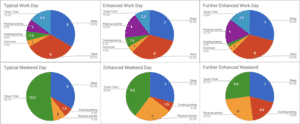You hear it every day – “I can’t do that, I’m too busy, there just aren’t enough hours in the day!”.
In some cases, those statements can be true. In others, they’re really convenient defense mechanisms for us to avoid challenge.
I spent the vast majority of 2018 training for a full Ironman triathlon.
In the peak portions of my training, I was required to exercise up to 30 hours a week (also known as, a part time job).
One of the most common questions/statements/reactions I got when telling people this was “oh geez, where do you even find the time to do that?”.
The answer was relatively simple though – we all have a lot more time on our hands than we think.
Training for an Ironman was easily one of the hardest things I’d ever done. Figuring out the logistics of how/when/where I was going to train, was arguably harder than some of the training itself.
The (mental) exercise of determining a proper schedule, started with taking a serious look at how I spent my time each day.
There were a few items that simply had to remain the same:
Not really much time to be squeezed out of those categories, but then again, that only equals 10.5 of 24 hours. So what else is there?
That’s 3.5 hours of downtime on a work day. If you remove the 8 hours of work and 1 hour commute for weekends, that’s up to 12.5 hours of ‘free time’ on weekends.
Seems like quite a lot.
Here’s a nice visual of a “normal” work day and weekend:
For me, Ironman training would take roughly 4 hours a day during the week (including commutes to the pool/gym/etc. + showering and all of that), and in some cases 6 hours a day on the weekends in peak training (mainly bike rides).
Knowing this – I had to shift some time around to make that possible, while still maintaining some downtime to spend with friends/family.
On weekdays, I:
This still left me with 7 hours of sleep and 2.5 hours a day to do… whatever I wanted, while also accounting for a double up in the time needed to train for Ironman.
On weekends, I:
That still left me with 9.5 hours to do whatever I wanted, and allowed me to get 7 hours of sleep.
These enhanced days ended up looking like this, in comparison to the typical days:

All I did to squeeze in more Ironman training time, was take away sleep and downtime, but what if I wanted more of those during the week when I was busiest?
Well, I already noted that I still have to work 8 hours, sleep for 7 (at least I’m not willing to give up any more of that), eat, rest, etc. So where would extra time come from?
For me, it came in the form of better utilizing the 9.5 hours of downtime I had during the weekend days.
I started food prepping meals (breakfasts, lunches and dinners) for the entire work week between Saturday and Sunday.
Doing prep at this time, allowed me to cut time out of cooking/cleaning during the week and re-add that time back to ‘down time’, all the while still having 6-7 hours of free time during the weekends.
That fully optimized schedule (compared to the others) looked like this:



Here are few other tips you can use to squeeze more time out of every day:
The average person spends 3 hours and 15 minutes staring at their phone every day.
Most of that time is social media and doesn’t even include Netflix, HBO, etc.
Many phones now are starting to include app timers and digital wellbeing settings to help restrict the use of your phone.
Imagine spending only an hour a day checking social media and getting 2.25 hours back to start a side gig, work on a hobby, go for a run, learn to cook…. etc. etc.
There is a great article on HuffPost that talks about the mental implications of constantly saying “I’m busy”.
Something funny happens when you tell somebody you’re busy and they ask what you have going on. When you attempt to answer the question out loud, it doesn’t sound quite as paralyzing as you’ve made it out to be in your head.
Your life isn’t busy – your life is full, full of things you’ve chosen to do instead of things you’ve chosen not to do.
The next time you think you’re very busy, take a second and write down a list of ALL the things that have you so flustered. You’ll find that list is typically smaller than you think, and that realization can help with prioritization.
When you effectively prioritize, you can execute, and when you focus on executing, you typically are more efficient.
Higher efficiency results in getting more done, and getting more done means less left to do 🙂
I’m a huge fan of this little anecdote:
If you were given $86,400 at the start of the day, and somewhere along the way you dropped $60 and lost it, you might be upset that you lost that $60.
After all, $60 is $60.
But would you take your other $86,340 and throw it in the garbage because you lost $60? Probably not.
So why would you waste a whole day worrying, complaining, or fretting over something that happens to you in 1 minute.
So many of us do this – one tiny little inconvenience causes our whole day to be ruined, but why?
We have 86,340 other chances to remain positive & productive in our day. Work within that perspective, and you’ll see just how much more time exists for you every single day.
Now the only conundrum you have.. is what you’re going to do with all your new free time?
Get exclusive training secrets and productivity tips in your inbox to level up your life.